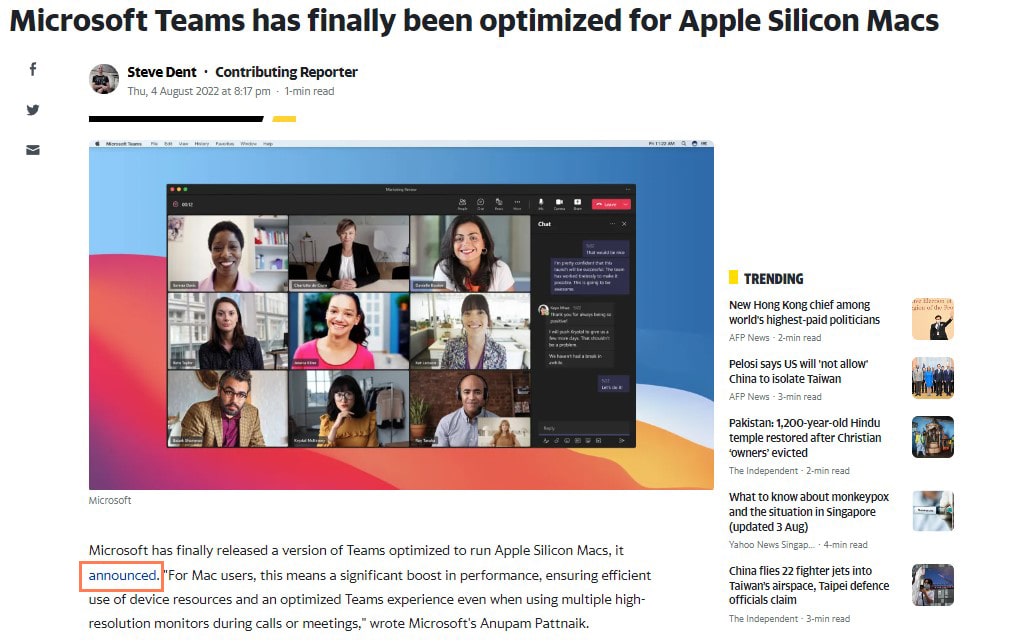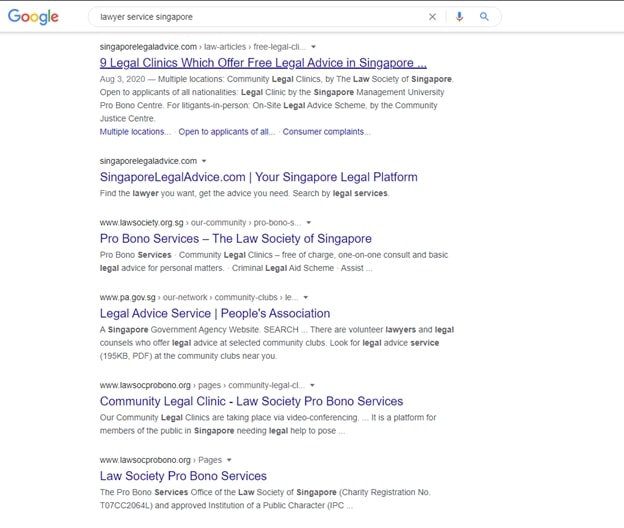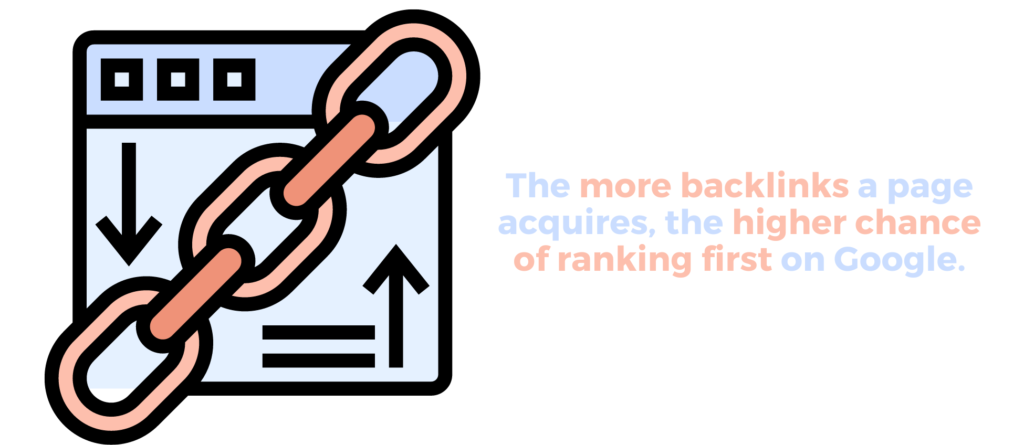An Introduction to Backlinks – What does a backlink mean?
If you are in the world of SEO, chances are you have heard about backlinks. The most common saying is that backlinks are the most important when it comes to ranking well in search engines.In
Simply put, backlinks are links from external sources (other domains) that point to your website (your domain) pages. Though most commonly used as “backlinks”, they sometimes are called “inbound links” or “incoming links” by different parties.
Indeed, for the past two decades, backlinks are the most important ranking factor when it comes to SEO, though the quality of the content have started becoming important recently.
Backlinks act as paths for organic traffic and web crawlers to travel from other domains to yours. Pages with many acquired backlinks have a higher chance of achieving a higher-ranking status on search engines.
Why Are Backlinks Important?
Backlinks are essential for both search engines and organic users.
Backlinks help with ranking. The term commonly used is ‘vote of confidence. Effectively, that means that backlinks show Google and many other search engine algorithms that the website is worthy of many aspects that Google can reward. This includes website authority, topic relevance, search visibility and ranking position.
Backlinks help improve your page’s organic traffic. Search engine crawlers travel through the internet every day and hour through backlinks. By checking for new links, crawlers end up at popular pages more often than unpopular ones. By rediscovering your webpage more frequently, your website is associated with your linked websites. This also works for organic traffic, giving your website more of an online presence.
Do Backlinks Still Work in 2022, and how can I Acquire Quality Backlinks?
The focus of backlinks has been rumoured to have changed and dwindled in effectiveness over the last decade.
However, countless pieces of evidence in the field of SEO point to backlinks being a key foundation of Google’s PageRank algorithm.
“The more backlinks a page has, the more organic traffic it gets from Google.”
– Ahrefs
Nevertheless, not all backlinks are good links. Too many backlinks from unreliable or dubious sources can lead to harmful effects on your site’s SERP.
Many factors can determine a link’s quality and effectiveness. Finding out what makes a good backlink can help you avoid harmful practices that might cause your website to dip in ranking.
What Makes A Good Backlink?

Some backlinks (inbound links) carry more value than others. You will gain more value from obtaining links from relevant websites within your industry or niche rather than having a link from an old, spammy, unvisited website.
- Good backlinks should have relevance. Google places more value on relevant backlinks and links that are clicked through more often, as this click-through shows a link’s ‘legitimacy’. Having backlinks from sources related to your website also makes the website look legit. In the eyes of Google, having an interior design website link to an accountancy webpage may seem a bit off, as there is little to no overlap in keywords for these two industries.
If many sites link to the same website (or baby webpages), search engines may interpret that content is worth linking to and, therefore, also worth ranking higher on a SERP. - Backlinks from strong pages may not always transfer more backlink authority, but backlinks from authoritative sites are always good to have. There are many statistics to measure a site’s authority. URL Rating (UR) is AhRefs’ page-level authority metric and carries a score from 0-100.
In the past, the number of backlinks was a strong indicator of a page’s popularity. Since Google’s Penguin update nearly a decade ago, more focus has been placed on the quality of links. - Having more clicks on the backlinks adds value to your site’s SEO ability, as it shows to Google that your website is more likely to attract user clicks, which translates to, again, a ‘vote of confidence that is given by web users to your website. With more traffic on their website, you also get a higher chance of redirecting the audience onto your website. Backlinks can connect similar information points that a searcher may be interested in clicking.
- Link Location is an aspect that many web owners neglect. Links need to be placed in an optimal spot in an article for it to be enticing enough for users to click on them.
Does external linking help my SEO? Why do I need to use outbound links?
Outbound links, also known as external links, are links out of your website to others. Just as backlinks into your website differ in value, links out of your website have varying degrees of SEO weight.
Optimising outbound links is one of the SEO tactics that the industry’s opinion is commonly divided. Some believe they are essential for optimisation and provide the website with enough SEO juice to boost its ranking and online presence. Others, on the other hand, believe it does little to no change affecting one’s ranking.
- Nevertheless, outbound links can add more context and link a reader to a separate source of information. Usually, outbound links are used to enhance information about the topic. Writers use them to back up information presented in their articles, usually using authoritative sources as a backup. This is important when touching on complex topics that may require more explaining for readers to understand the concepts.
- Linking to other authoritative websites is a great way to provide value and information to your readers. Links help users find out more about the industry or topic. Outbound links are how you often reference your source. By citing and linking to the source, you build rapport with your readers in establishing yourself as a trusted source of information. In a world where fake news runs rampant online, trust is sadly becoming a form of currency.
- As of Google’s August 2019 Update, Google sees clear citing of sources as a form of evidence for expertise. The understanding is that experts in an industry or field will likely know the right sources to cite as opposed to writers who are less familiar with the context.
- Outbound links build relationships with other websites. Few people would argue that you should never link out from your content as it drives people away from your website. However, offering outbound links could be the start of healthy business collaboration between websites, effectively gaining you more backlinks in the future.
These also highlight the importance of positioning and working your way up in the ranking ladders to be an ‘authoritative source’. Having a solid footing as a source of information would incentivise other websites to link to you, effectively providing you with regular free backlinks.
This is why content marketing is commonly referred to as link building.
Speaking of link building…
4 Steps to Link-Building Best Practices
Backlinks can be time-consuming and labour-intensive to obtain. Newer sites looking to leave their digital footprint online may be at a loss on where to start. That is where backlink research comes into the picture.
Backlink research forms the foundation of link building. It is the usual first step that digital marketers take before embarking on link-building strategies. Anecdotally, it resembles sketching a map of the road you are about to drive along, taking note of the direction, pitfalls, and hard turns.
By examining the backlink profile of your competitors, you also stand to gain insight into the backlink landscape of your industry and competition.
From there, it is easier to formulate link-building strategies after reverse-engineering what works and what does not for your competition.
How to do Backlink Research
Attaining backlinks is an essential aspect of off-site SEO strategies. This process is usually referred to as ‘link building’.
Backlink research will end you with a collection of pages and domains linking to a website. There are a few metrics that you should take note of:
- Anchor text – the anchor surrounding the link.
- Domain Rating (DR) – the score given by Ahref to indicate a website’s authority.
- URL Rating (UR) – the score given by Ahref to indicate a specific web page’s authority.
- Referring page – the page linking to the target page. This will give you information on what site is giving the backlink juice.
- Web Traffic – total average estimated monthly organic search traffic to the linked page.
We will be using Ahref’s Keyword Research tool for the following example. However, there are plenty of other available tools on the internet, such as SemRush and Moz.
Step 1 – Determine your competitors.
Find the source of your competitors’ links. Then, proceed to replicate them. In most cases, your competitors are the ones who already rank high in Google’s SERP. Established sites will have a ton of backlinks to their website, which you can convert into link-building opportunities.
To do this, simply open your browser’s Incognito Mode. It is important to use the Incognito Mode so that your search results will not be affected by pre-existing cookies.
Enter a search for the keyword which you wish to rank for. The ensuing top three results on Google’s SERP would be good sites for you to reference for the following link-building activity.
For the following example, we will be using ‘Lawyer Services Singapore’ as an example.

Step 2 – Reverse engineer their backlinks.
Next, go to Ahrefs Site Explorer and punch in the first URL on the SERP to their online site explorer too. For our example, it will be SingaporeLegalAdvice.com.
Select exact URL (for web pages) or domain/ (for websites) mode from the drop-down.

On the left toolbar is a backlink report that you can click on to download. The backlink report file can be exported and opened with Microsoft Excel.
Repeat this process for the subsequent few URLs on the SERP.
Step 3 – Filter and Sorting the backlinks
Now, what can you do with this information?
Firstly, we have to narrow down our backlinks. You can narrow and filter out unnecessary information through filters on AhRef’s site explorer. Filter out any language except English and set the Link type to Dofollow to give you a better list of insightful links.
Next, sort the links based on traffic, from high to low. This allows you to prioritise links from pages with the most traffic. Pages with high traffic are valuable due to the organic traffic it attracts daily. They can be resources to tap into for joint ventures and partnerships.
More organic traffic means more referral traffic, as there is a higher chance that someone will click on your link and land on your webpage.
And we only want to focus on high-traffic websites because…
Step 4 – Outreach
You want to outreach to websites with a higher traffic count.
Work your way down your list, paying attention to the context of each link and its key metrics. Figure out a script and method of outreaching the webpage, asking them if they are okay with adding your link alongside your competitor’s. This is the tricky part, as there are only a couple of reasons people would want to provide a backlink for you.
There are a couple of strategies that you can attempt.
What is a Backlink Strategy?
A backlink strategy, or rather, a link-building strategy, revolves around studying your opponents in your industry.
We can understand more about the industry and your competitors through backlink research to mimic and outperform their backlink portfolio.
Backlink strategies help companies and digital marketing teams to guide their backlink building process – What type of backlinks to build? What format to use? Which area of the internet to outreach towards? These key questions can guide a user through the backlink-building process.
So, How Do You Build a Backlink?
There are many ways to build a backlink. There are also different categories of backlinks.
To start, performing a Google search for a topic or post and studying what is already ranking well is a good starting point on what content to write about and include in your backlink or content marketing strategy.
Building backlinks is about reaching out to other site owners to ask them to link to your page. There can be plenty of reasons why people would want to do that for you.
For one, guest blogging is a common win-win strategy for websites to share their audience and obtain new ones. As the name suggests, you will be writing a one-off post for their website while they offer one for you too.
The content can be similar but ultimately serves as a way to funnel and direct their audience to your site, effectively converting them into audience members. Naturally, for this to work as a win-win strategy, your website must have a following and regular traffic to convince your collaborative partners that you are a site worthy of guest posting.
Broken link building is another age-old strategy used by many digital marketing firms. By finding relevant dead links on other sites, usually directories, you can then reach out to suggest to them to use your website as a working link instead. Plenty of broken link checker tools are available on the internet for this purpose.
Unlinked mentions work in the same way, but instead of sourcing for broken links, you can approach blogs or articles that did mention your brand and website but neglected to provide a linked reference to your website. Under normal circumstances, it is tough to source for this area of opportunity. However, when studying your competitors or potential partners in your vertical, you may come across it.
Partnership links are more common and less intrusive. Partnership links usually involve exchanging backlinks in the form of referrals or badges. This allows both websites to share their audiences effectively, creating a win-win situation. Partnership links are not challenging to achieve but take time and effort. Build relationships with websites over time. If their content suits what you are writing, reference it in your articles or reach out to them asking if it is okay to feature their article on your website.
Social media profile links are also worthy of mention. While social media links may not have the rank-impacting influence that most other links do, they can help you direct organic traffic online to your website.
Profile links can also come in the form of forum profile links, which can help your company grow its brand awareness when your online presence in the local community becomes noticeable.
Earning Backlinks
Apart from building backlinks from scratch, websites can also earn backlinks themselves. It is a long process but involves content marketing and a little word of mouth.
By creating useful content, you position yourself as an information leader in the industry that other websites would want to reference and link to. An example of this can be seen on The Woke Salaryman website. Since its first post in April 2019, The Woke Salaryman has been officially one of the top Singapore finance blogs. Having caught on to viral trends and using relevant content and storytelling mediums, the website can garner a massive following at a rapid rate. Its easy-to-digest infographics allow users to share their content easily.
Similarly, websites like TheSmartLocal and Moneysmart post regular news and promotional gimmicks that may entice readers to share online as a resource.
The benefit of this strategy is that these backlinks earned are organic and scalable. After the initial groundwork, there is no need to monitor or perform tedious labour to acquire more backlinks. Instead, your audience members would do it themselves, saving you the trouble.
The following are useful starting points for creating quality and reader-appreciative content which can lead to backlinks:
- Ultimate ‘How to’ guides
- List posts
- Infographics
- “Why ____” explanation posts
Referral links
Having your product or service reviewed or represented by a reputable figure can be a viable method to earn backlinks to your site. Popular bloggers or social media personas can be a huge source of organic traffic for you to tap into.
Buying Backlinks
Link purchasing is an available practice but is frequently frowned upon and less effective. Paid links are a dangerous realm to enter. According to Ahref, out of 630 blogs, the average price of paid links can go up to above $300. Buying links is an attractive method to entertain. You pay and you get results. However, $300 is not cheap for a single link.
Buying links is often seen as a manipulative practice, sometimes referred to as black-hat SEO, a practice that may get your site banned from the search results.
In reality, you are better off engaging a third-party digital marketing agency to build your website’s backlinks. It might take longer to obtain links, but it will probably be more cost-effective than throwing money for paid links.
Having links from websites irrelevant to your industry may adversely affect your website’s SERP status. Google’s algorithms are complex and constantly evolving. With lesser focus placed on quantity rather than quality, there is even lesser reason to entertain the idea of purchasing links.

Which Link Building Strategy is the Best?
When it comes to link building, experience matters. Each industry’s link-building tactics work differently. Having an experienced digital marketer manage your link-building strategies could save you time with the initial trial-and-error stages of your digital marketing.
“The more backlinks a domain has, the higher is its position on the SERP.”
How Can I Get Free Backlinks?
Free backlinks result from an investment of time and a game of patience. As mentioned before, useful content can be leveraged to earn you backlinks which are essentially free, as a product of your hard work and disciplined link-building strategy.
These backlinks have lasting effects and can help improve your website’s professional network, gaining more potential partnership links or joint ventures in the future.
The process of building ‘free backlinks’ can give you a better understanding of your industry through backlink research and market research. That knowledge will help weigh the effectiveness of SEO against other marketing channels or formulate other strategies, such as pay-per-click ads.
However, it is important to note the importance of getting links from good sites. Tons of free sites such as social bookmarking or article submission sites are toxic and can instead harm your web.
Link Building Best Practices
- Consider who and which webpage you are linking out to. Outbound links, as previously mentioned, should be used to establish your information and cite your sources. It is crucial that you carefully choose your sources.
- Avoid forcing links into your content. If you find the need to, you are likely doing it wrongly. Links make the best sense when the context is right, and there is a need for reference.
- Check your outbound link issues. Use site audit tools to see a list of outgoing links to your website. Double-check if there are any links with an unintentional nofollow attribute. Alternatively, you can hire an external party to perform an SEO audit for your website.



